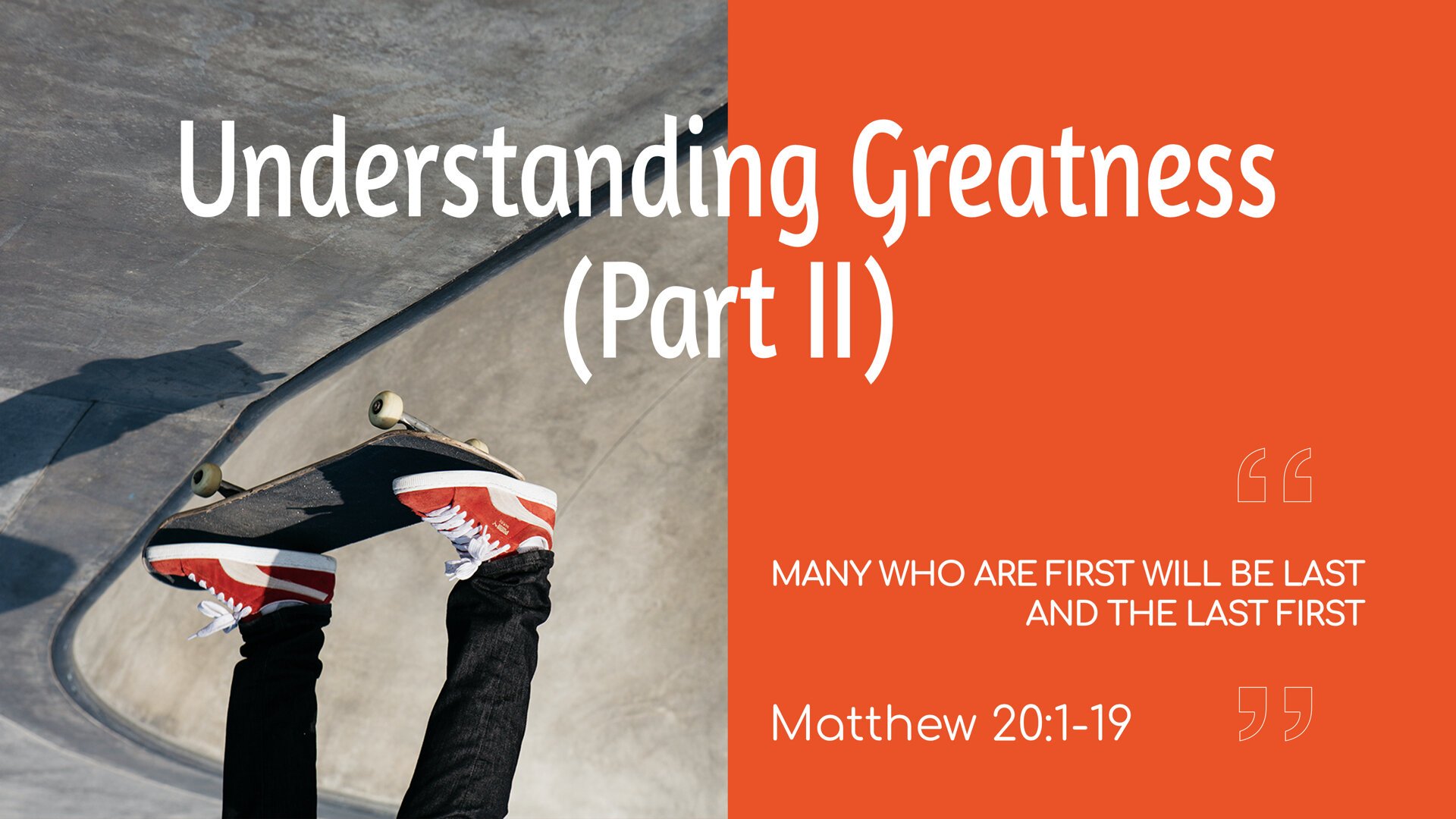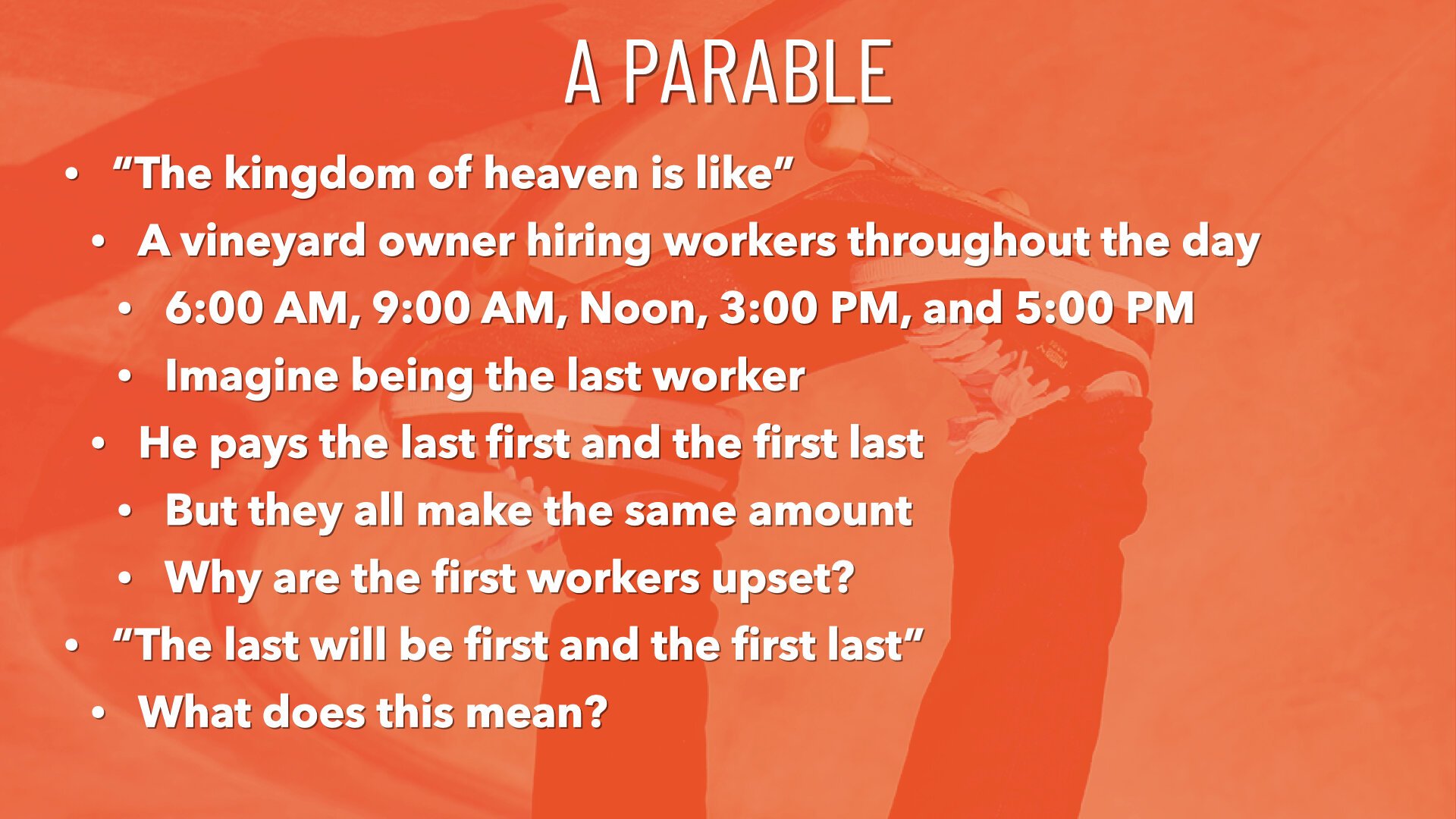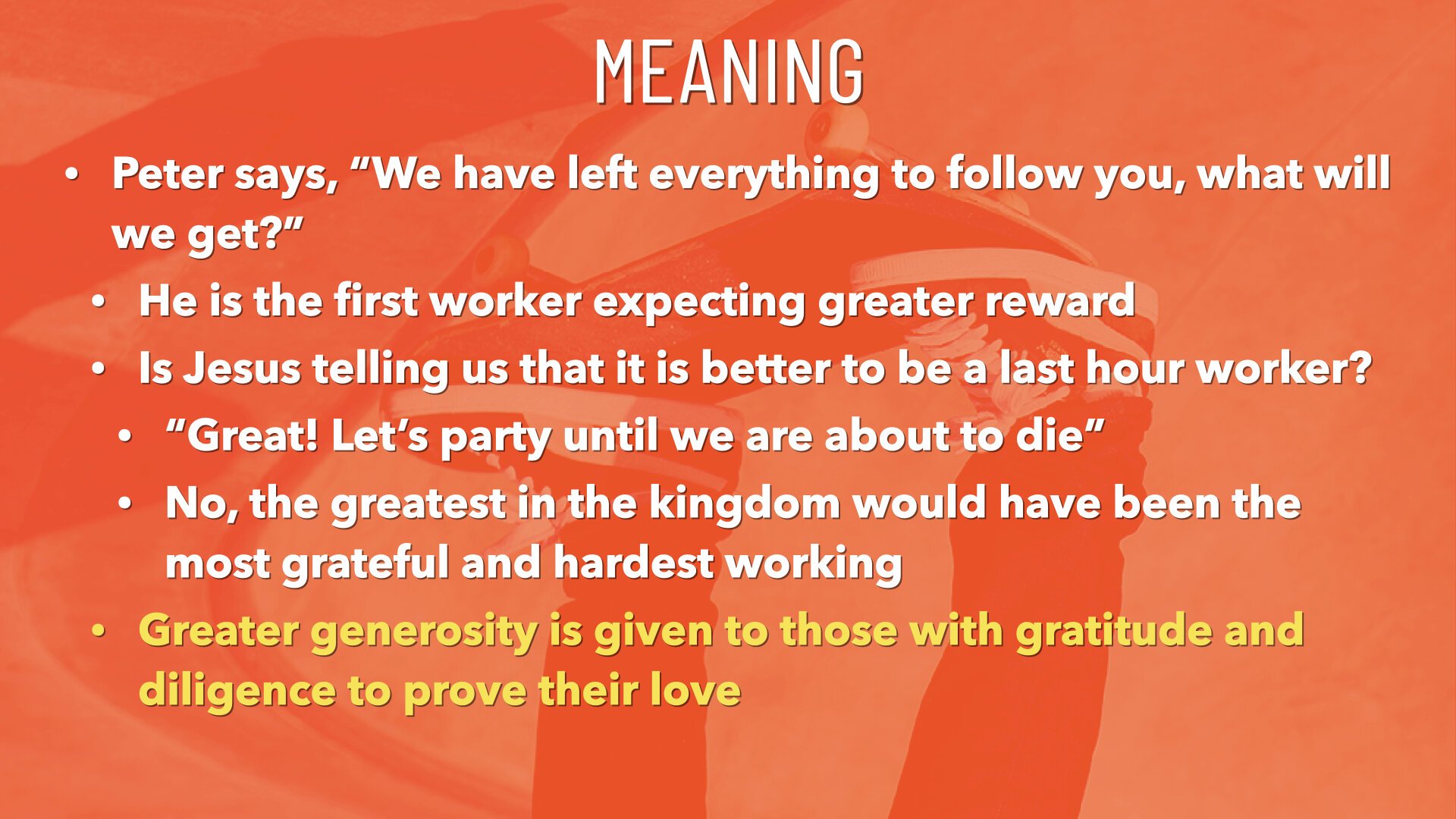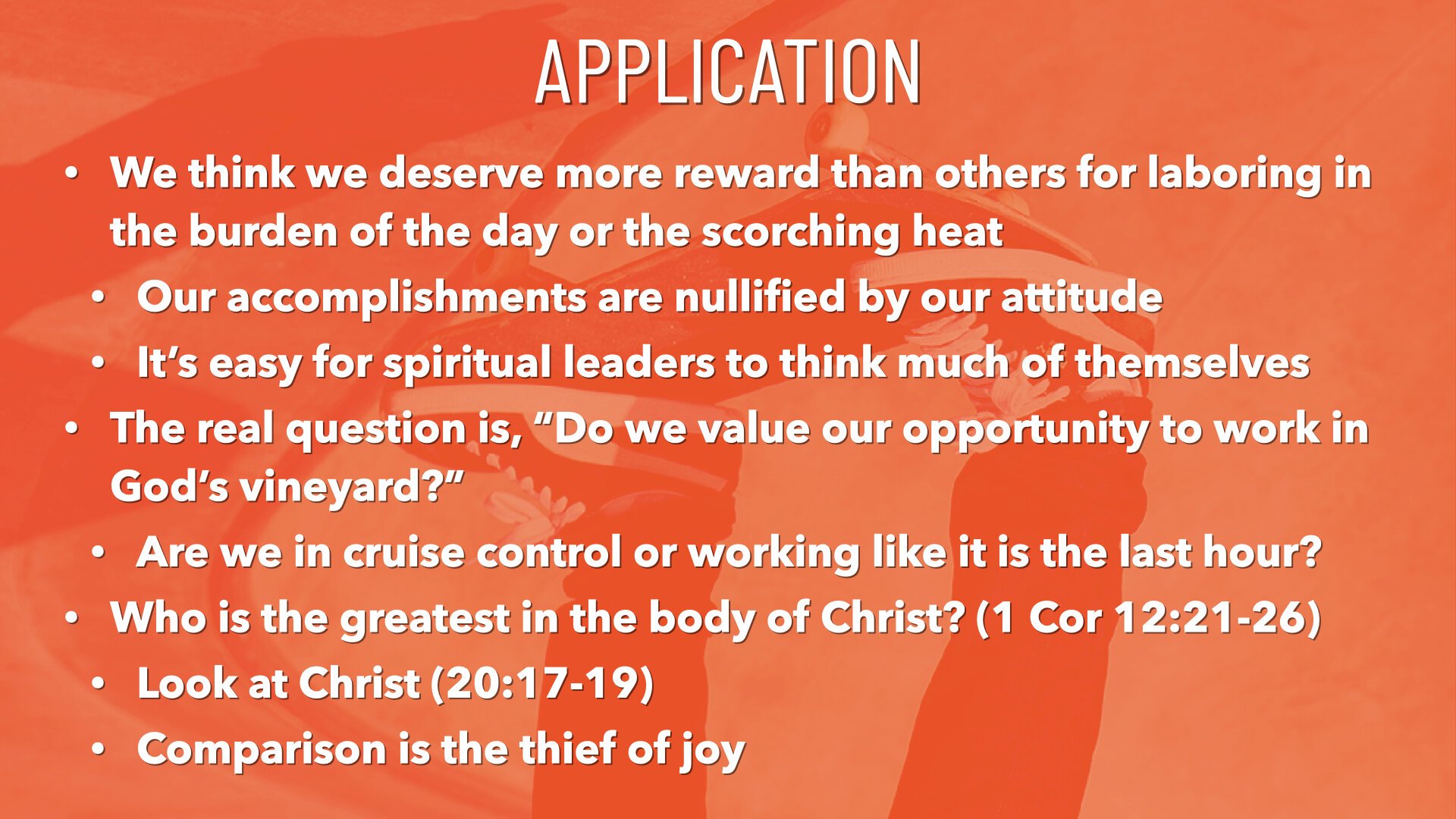Understanding Greatness II (Matthew 20:1-19)
A local church is composed of many different people, but who is the best? To the world, the best is easy to determine. It's the guy who stands up and talks to everybody. But to God, it's not so cut and dry. The best in the kingdom of God is not based on accomplishments. It's based on other factors. So, technically, someone you think of as the least could be the greatest. How does this work? Today, we are going to study another text that helps us grasp this complicated idea.
We have seen the disciples struggle since Chapter 16 with this concept. If you are like me, you feel their struggle. Jesus doesn't say what we expect him to say. He is not pursuing the life of greatness that we expect him to pursue. When crowds start to form, he seeks to get away from them. Probably the most strange thing Jesus has said twice so far is that he must go to Jerusalem, suffer, and die. That's not what the great people do. Great people conquer, and they never suffer. At least, that's what we think.
What makes us great? We are so used to associating greatness with all the wrong things. We think power, control, achievement, and wealth are indicators of greatness. We think that we can find greatness on the backs of others. However, Jesus has taught us to find greatness through humility. If we become small in our own eyes, we will enter the kingdom of heaven and find the greatness we are searching after.
Last week, we studied about the rich young ruler. He was hoping to do enough good to obtain eternal life. He has the right perspective on life in one sense, realizing that he hasn't done enough yet. But he fails to recognize that he can never do enough. He is told to sell everything and give it to the poor. Then, he can follow Jesus. That's when we find out that he loves his possessions. He walks away sorrowful. With man, it is impossible to obtain eternal life. He needs humility. He must learn to rely on God's grace. With God, all things are possible. In response to this, the disciples confidently say that they have left everything. They consider themselves great! Jesus commends them for that and promises a rich reward, but he says, "The first will be last and the last first."
The First Last, The Last First
What does this phrase mean? Some of you came asking this question after the last sermon. Time would not allow us to go into what this means last week, but we will see clearly what this means tonight. As we continue our study, we find a parable in Chapter 20. It starts with the word "For" because it is explaining what that phrase means.
Matthew 20:1--16 (ESV) --- 1 “For the kingdom of heaven is like a master of a house who went out early in the morning to hire laborers for his vineyard. 2 After agreeing with the laborers for a denarius a day, he sent them into his vineyard. 3 And going out about the third hour he saw others standing idle in the marketplace, 4 and to them he said, ‘You go into the vineyard too, and whatever is right I will give you.’ 5 So they went. Going out again about the sixth hour and the ninth hour, he did the same. 6 And about the eleventh hour he went out and found others standing. And he said to them, ‘Why do you stand here idle all day?’ 7 They said to him, ‘Because no one has hired us.’ He said to them, ‘You go into the vineyard too.’ 8 And when evening came, the owner of the vineyard said to his foreman, ‘Call the laborers and pay them their wages, beginning with the last, up to the first.’ 9 And when those hired about the eleventh hour came, each of them received a denarius. 10 Now when those hired first came, they thought they would receive more, but each of them also received a denarius. 11 And on receiving it they grumbled at the master of the house, 12 saying, ‘These last worked only one hour, and you have made them equal to us who have borne the burden of the day and the scorching heat.’ 13 But he replied to one of them, ‘Friend, I am doing you no wrong. Did you not agree with me for a denarius? 14 Take what belongs to you and go. I choose to give to this last worker as I give to you. 15 Am I not allowed to do what I choose with what belongs to me? Or do you begrudge my generosity?’ 16 So the last will be first, and the first last.”
In this parable, we see the master of a vineyard hiring laborers throughout the day. He hires some at 6:00 AM, 9:00 AM, Noon, 3:00 PM, and 5:00 PM. The first group agreed to work for one denarius a day. The master told every other group that he would pay them whatever is right. That's a vague agreement, but apparently, the master was trustworthy, or they were desperate. They accepted the deal. As the day gets later and later, we need to recognize that those who are selected were growing more and more hopeless. They were all probably hoping for a full day's wage to get them through the next day. If they don't work, they can't eat. Those who were called in the eleventh hour were probably feeling hopeless. They were thinking, who will hire us? We aren't worth being hired, and now we will starve to death along with our family. What are we going to do?
When the workday is complete, the master calls the last laborers first and gives them a full day's wage! Can you imagine being hired in the eleventh hour, hardly doing any work, and receiving a full day's pay? That would be weird. Many of us wouldn't even want to accept it because we didn't earn it. But that's precisely the point! The guys who have been working all day see the last laborers get a full day's denarius, and they think that they will get more because they did more. That logic makes sense to us all. It's not fair for them to work so much less and get paid the same amount. But when it came to their turn, they only received what was agreed upon, a single day's wage. That's it! They start grumbling because they didn't receive more.
But the master's response is interesting. He says, "Friend, I am doing you no wrong. Did you not agree with me for a denarius? Take what belongs to you and go. I choose to give to this last worker as I give to you. Am I not allowed to do what I choose with what belongs to me? Or do you begrudge my generosity?" Do we sense the wisdom in these words? He makes the point that the first workers are ungrateful and proud. They aren't considering the generosity of the master. It may feel like this is unfair to them, but it's only unfair to the master. He is paying a massive amount for hardly any work. Then, we see the last words match the first words, "The last will be first, and the first last." They are spoken in reverse order, but they say the same thing.
Meaning
What does this phrase mean? The parable explains greatness to us. Do we see it? This all began with Peter saying, "We have left everything to follow you, what will we get?" Do you see his expectation? He is the early worker. He has sacrificed much to follow Jesus, and he expects more. He is first, but he will be last and disappointed.
But don't misunderstand. Jesus isn't telling us that we want to be the last worker. If that is the lesson you take away from this, you weren't paying attention. Jesus wants us to see that the master chose the last worker first because he would have the most gratitude. He sees that he did not earn what he received. He has a sense of humility and lacks any sense of entitlement. That's what God wants to see in us. It's not that he wants us to barely work. I imagine that the last workers were doing everything they could at the end of the day to earn as much as possible. That's who we are called to be. Greatness is understanding the great unworthiness inside of us and seeing the enormous generosity of God.
Application
How do we feel about our calling? Do we do a lot of work like the disciples and think we deserve more. Do we barely scrape by because we don't value the opportunity we have been given? We may receive eternal life, but nothing more. We need to see the extreme difference between what we are offered and what we deserve. We deserve to be left for dead. God, in His infinite grace, has decided to bring us into his labor. That's what the kingdom of heaven is like.
What attitude do we bring to work for the master? Do we say, "We have borne the burden of the day and the scorching heat?" Do we think much of our past accomplishments? As a preacher, teacher, or spiritual leader, we may feel this way, and we may put it on cruise control. Our attitude brings us from first to last. So many times, Christians who are most grateful start out wanting to do more for the master. But as they do more, they feel more pride and fall into the entitlement stage where they think much of themselves.
If we have the mindset of the last workers, we can be the greatest in the kingdom. It doesn't matter what role you play in the body of Christ. Anyone can be the greatest. But our attitude toward our work is critical. We receive eternal life as a gift from God. Do we respond with a feeling of unworthiness? Do our work ethic and attitude toward our work show this feeling of unworthiness? Are we the last-hour worker, or are we in cruise control? We have to keep the mentality that we aren't worthy of our blessing. When we let our kids help do work at a young age, they don't improve things. Sometimes their work is more of a problem than a solution. But we love their desire and their heart. That's what God wants to see in us but without the sense of entitlement and the pride.
Comparing Sacrifices
What is our expectation? We posted on our Facebook page the saying, "Comparison is the thief of joy." I love that saying. It is so true and so important to remember. But there is one comparison that creates joy and a desire to do more. All of our sacrifices are nothing compared to the sacrifice that Jesus made on our behalf. In all of our sacrificing for God, we should see ourselves as barely offering anything for God. Notice the reminder of this sacrifice immediately following this parable.
Matthew 20:17--19 (ESV) --- 17 And as Jesus was going up to Jerusalem, he took the twelve disciples aside, and on the way he said to them, 18 “See, we are going up to Jerusalem. And the Son of Man will be delivered over to the chief priests and scribes, and they will condemn him to death 19 and deliver him over to the Gentiles to be mocked and flogged and crucified, and he will be raised on the third day.”
Jesus wants his great act of humility and love to be seen and understood by the disciples. He is making himself last even though he is the first. Jesus allowed himself to become the lowest form of humanity so that we might be saved from our sins. This made him the greatest man ever to live.
Conclusion
So many times, we hear the idea, "If you ain't first, you're last." Everyone wants to be the first. Everyone is self-focused and determined to win every argument. If we aren't careful, we can fall into this trap as well. That's not who we are. We are called to be people who live with grateful hearts. We must do like Paul in Philippians 3.
Philippians 3:13--14 (ESV) --- 13 Brothers, I do not consider that I have made it my own. But one thing I do: forgetting what lies behind and straining forward to what lies ahead, 14 I press on toward the goal for the prize of the upward call of God in Christ Jesus.
We press on toward the goal as though we haven't made it because we never will. Eternal life is a generous gift from God. He promises great treasure for those who are humble children, laboring in his vineyard and submitting to his will. We need the right heart and the right attitude or spirit. God saved us to be to the praise of his glory, to shine as lights, and to lift others. Let's show our gratitude.




